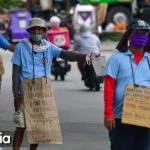2020 saw Filipinos being more critical of the government, owing to the fact that a major government-owned and controlled corporation just swindled P15 billion from Filipinos.

The sad part, however, is that there are people hellbent on pinning the blame onto someone else—like the opposition and “their influencers.”
A new script seems to have appeared on Facebook for the Duterte administration’s supporters that pin the blame not on a specific opposition figure, but on social media influencers.
https://twitter.com/jaeceelim/status/1347187695278178307
The script seems to supposedly involve the Dilawans or Yellows, the color of the Liberal Party. According to the script, the P15 billion stolen by Philippine Health Insurance Corporation (PhilHealth) officials didn’t happen over the Duterte administration; it allegedly has been happening since the time of the late Corazon Aquino.
It seems to imply that PhilHealth from Aquino’s time has been slowly building up the P15 billion and only came to a head during President Rodrigo Duterte’s term.
It also shows a photo of some of the more vocal Twitter handles that have criticized the administration who have benefited from the billions of pesos stolen by PhilHealth officials over the decades
<photo of influencers here>
The list includes Macoy Dubs, PinoyAkoBlog (Jover Laurio), ABS-CBN artist Maris Racal, voice talent extraordinaire Inka Magnaye, and forward-thinking post-millennial Frankie Pangilinan.
The comment has since been deleted—or more likely reported, but the influencers mentioned have since reacted to allegedly being beneficiaries of the P15 billion collected by the PhilHealth mafia.
https://twitter.com/inkamagnaye/status/1347472048260464642
Parang wala naman akong natanggap. 🙄🙄🙄
— Jover Laurio (@PinoyAkoBlog) January 7, 2021
https://twitter.com/macoydubs1/status/1347368652241190913
san po sweldo ko ilang buwan nang nagiipon pang mic pls reply tnx
— kakie 🇵🇸 (@kakiep83) January 8, 2021
As expected, people poked fun at it, though one real issue seems to have caused this particular script to disappear into irrelevance.
A quick trip to PhilHealth’s website shows just how flawed this particular script is. PhilHealth was created in 1995–midway through former President Fidel V. Ramos’ term—“to respond to the public’s clamor for a more responsive health insurance.”
The idea behind the script, though, may have come from Republic Act 6111, which created the Philippine Medical Care Commission (PMCC)—under the strongman Ferdinand Marcos.
Sadly, the PMCC never really panned out because the program wasn’t as good as people expected. This led to calls and bills being made until we finally got PhilHealth from Republic Act 7875 or “The National Health Insurance Act of 1995.”
PhilHealth has had a tumultuous history filled with scandals and fraud, the most recent being the P15-billion PhilHealth mafia scandal.
This is where the state insurer’s top brass—which includes health secretary Francisco Duque III—allegedly pocketed P15 billion in premium payments made by its members: working-class Filipinos.
The issues came about after a whistleblower by the name of Atty. Thorrsson Montes Kieth revealed the “inner workings” of PhilHealth and exposed the supposed mafia.
A flurry of resignations followed, including a Duterte appointee: former president and CEO Ricardo Morales.
Investigations have so far gone cold by today’s standards, as no updates have been given by government agencies investigating the scandal.
PhilHealth is also under fire for not paying the Philippine Red Cross more than half a billion pesos for conducting COVID-19 tests.


